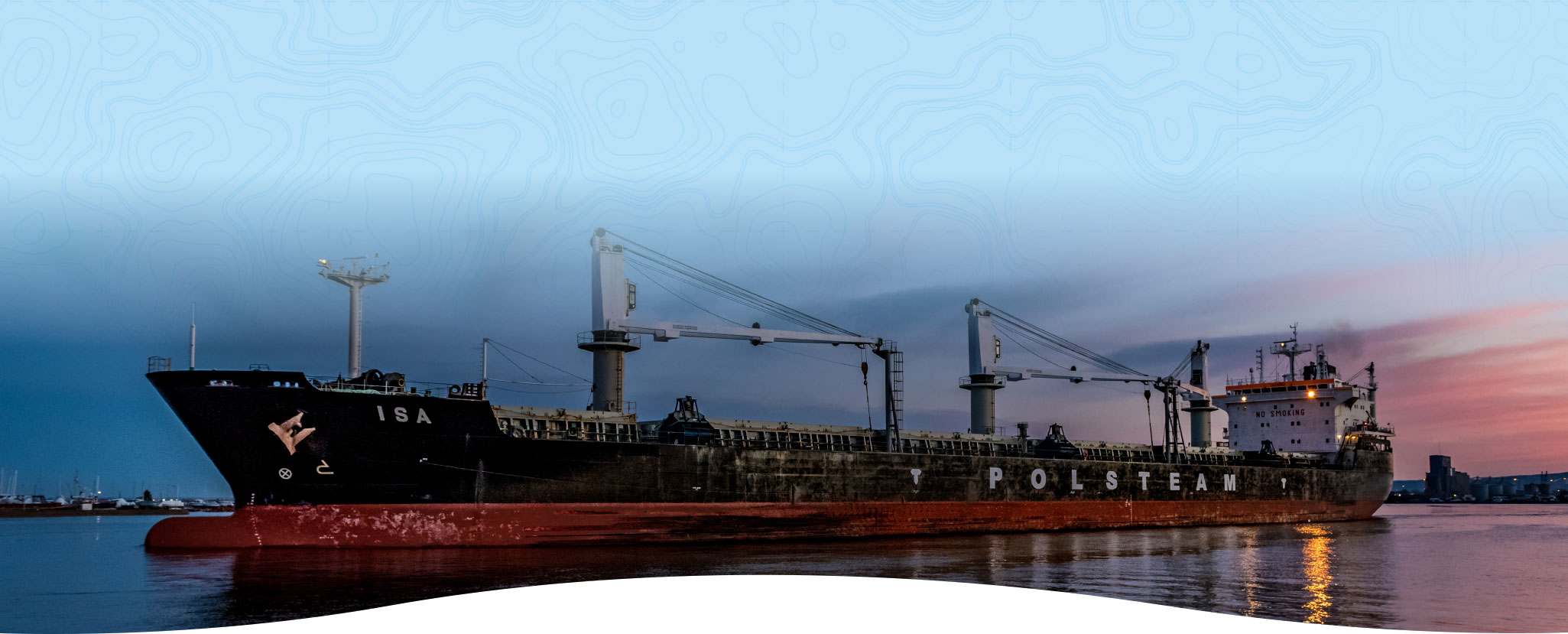
DULUTH, Minn. – Last night’s arrival of United States Coast Guard Cutters Alder and Mackinaw signaled that the 2019 commercial shipping season is soon to commence for the Port of Duluth-Superior and the entire region.
The Alder and Mackinaw made their way across Lake Superior from Sault Ste. Marie, Michigan, opening a 100-foot lane in the ice that will be widened soon by Canadian Coast Guard Ship Samuel Risley in support of breakout efforts that will also include local tugs from the Great Lakes Towing Company and Heritage Marine. Those efforts will help six vessels berthed in Duluth-Superior get underway downbound with loads in the coming days. Those vessels include (vessel name/winter layup location):
- American Spirit (Lakehead Pipeline Dock; Superior, Wis.)
- H. Lee White (Hansen-Mueller Elevator M; Superior, Wis.)
- Kaye E. Barker (Fraser Shipyard; Superior, Wis.)
- Lee A. Tregurtha (Fraser Shipyard; Superior, Wis.)
- Mesabi Miner (Superior Midwest Energy Terminal; Superior, Wis.)
- Tim S. Dool (Fraser Shipyard; Superior, Wis.)
The Kaye E. Barker is expected to sail Saturday for Two Harbors, Minnesota, where it will load iron ore bound for Indiana Harbor. The Lee A. Tregurtha is scheduled to depart Fraser Shipyards next week and load ore at the CN/Duluth Dock. The Mesabi Miner could be the season’s first commercial vessel to leave Duluth-Superior, as she’s slated to load coal tomorrow in Superior before departing downbound for St. Clair, Michigan.
Several vessels are scheduled to pass upbound through the Soo Locks when they open March 25, including:
- Algoma Guardian, bound for Two Harbors.
- Erie Trader, bound for Two Harbors.
- Great Lakes Trader, bound for CN/Duluth Dock.
- James R. Barker, bound for Silver Bay, Minnesota.
- Paul R. Tregurtha, bound for the Superior Midwest Energy Terminal.
- Stewart J. Cort, bound for BNSF Railway Dock in Superior.
- Wilfred Sykes, bound for Two Harbors.
Recent warming weather, rain and winds have helped reduce Lake Superior ice cover to approximately 65 percent, however, the U.S. Coast Guard reported ice fields in excess of 12 inches thick still remaining on the lake, along with approximately 16 miles of ice cover outside the Duluth entry. Because of these conditions, and the potential for changing ice conditions elsewhere on the lake, shipping operators are expressing caution about early-season sailings. A deliberate start to the season is expected.
To follow transits in real-time, visit MarineTraffic.com, BoatNerd.com, HarborLookout.com, or check mobile apps like Marine Traffic or Ship Finder.
Please note, all vessel departure and arrival plans are tentative estimates and subject to change without notice.
2019 Great Lakes-St. Lawrence Seaway System Opening Timeline:
March 20, 2019: U.S. Coast Guard Cutters Alder and Mackinaw arrived in the Port of Duluth-Superior. Canadian Coast Guard Ship Samuel Risley will follow Alder and Mackinaw, bound for Thunder Bay, Ontario. The three icebreakers, joined later by other icebreaking assets, will focus initial icebreaking activities on the western Lake Superior ports of Superior, Wisconsin, Duluth, Silver Bay, Taconite Harbor and Two Harbors in Minnesota, and Thunder Bay.
March 22, 2019: Welland Canal, connecting Lake Ontario and Lake Erie, is scheduled to open at 8 a.m. Eastern Time.
March 25, 2019: Soo Locks in Sault Ste. Marie are scheduled to open at 12:01 a.m. Eastern Time.
March 26, 2019: Montreal/Lake Ontario Section is scheduled to open at 8 a.m. Eastern Time. This will mark the official opening of the St. Lawrence Seaway’s 2019 navigation season. It is also the 60th anniversary of the Seaway’s opening, an event which connected U.S. Great Lakes ports in North America’s heartland to global markets via the binational waterway.
In 2018, the St. Lawrence Seaway recorded its best shipping season in a decade, with a nearly 7 percent increase in tonnage over the 2017 season. Gains were recorded in general cargo, including manufactured iron and steel, steel stabs, and containerized trade; dry and liquid bulk cargoes; and an exceptional 37 percent increase in shipments of U.S. grain exports. In the Port of Duluth-Superior, iron ore led the way. The 21.5 million tons of shipped ore was the most transported from Duluth-Superior in a single season since 1995.
###
Approximately 900 vessels and 35 million short tons of cargo move through the Port of Duluth-Superior each year, making it the Great Lakes’ largest tonnage port and one of the nation’s top 20. The Port supports 8,000 jobs and contributes more than $1.4 billion in business revenue to the regional economy. Learn more at DuluthPort.com.

